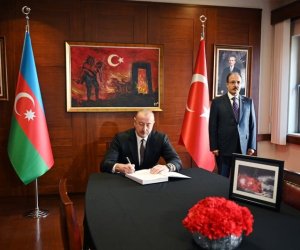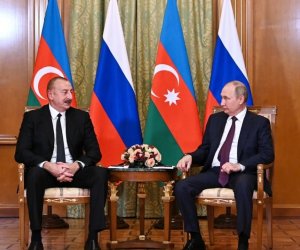Illinois voters should hold Sen. Mark Kirk accountable - TheHill

By Dennis Jaffe
Politicians like Sen. Mark Kirk are responsible for fanning the flames of injustice and human suffering in regions such as the South Caucasus. There, on one side of the geostrategic spectrum we have a pro-Western U.S. ally Azerbaijan, which has 16% of its legally recognized territory occupied by neighboring Armenia, which is on the opposite side of the geostrategic and ideological spectrum.
Despite similarities that these nations have due to centuries of friendship and living side by side, as well as shared Soviet experience, there are also key ideological and cultural differences, since Azerbaijanis made a philosophical choice of a strategy of peaceful development and modernization with no grand territorial ambitions based on selective historical claims, whilst Armenia chose the path of territorial aggrandizement and claims (against nearly all of its neighbors), ethnic cleansing (99% of the population is now Armenian despite being only 50% such a century ago) and embracing terrorism discourse as a legitimate and heroic way of achieving their goals (members of such terrorist organizations as ASALA are celebrated as national heroes to this day).
Both nations are flawed in terms of democratic development – because of the continuing Armenian military occupation of Azerbaijan’s region of Nagorno-Karabakh and surrounding seven districts since the 1992-1994 war, and a heavy burden of one out of ten Azerbaijanis being displaced and refugees.
Military occupation is expensive in terms of both financial, human and opportunity cost. According to Stockholm International Peace Research Institute (SIPRI), Armenia is spending 4.2% of its GDP on military – whilst Azerbaijan, a victim nation with 16% of its lands under military occupation, spends only 2.9% of its GDP on defense. Armenia, an extremely poor country from which Armenians are running away – also known as emigration – in droves, ranks third as the world's most militarized country, and European continent's most militarized nation (although, admittedly, geographically Armenia is fully in Asia). No wonder that in the opinion of the Congressional Research Service (CRS): "Armenia’s shift away from a war footing would also further U.S. interests in Armenia’s economic development and improved standards of living.”
But Armenian government is not hearing this common sense advice. In major part because of prominent politicians, and its enablers, like Sen. Mark Kirk, who was the co-chairman of the Congressional Armenian Caucus and received the top score of A+ from an Armenian lobby’s annual ranking of members of Congress (it should be noted that the same lobby group calculated that its contributions to various elected officials reach $5 million per election cycle).
Instead of heeding the advice of so many independent and authoritative analysts, instead of furthering U.S. national interests, and instead of at least refraining from rhetoric that is directed against a U.S. and Israel ally nation of Azerbaijan, Sen. Kirk like the other members of Congress he cites support the illegal Armenian military occupation of Azerbaijan, support Armenian irredentism, disregard Azerbaijan’s right of self-defense, and blatantly ignore four UN Security Council resolutions – for which the U.S. voted – that call for unconditional withdrawal of all occupying forces from Azerbaijan.
Sen. Kirk, who has made false claims about his military record as a Navy Reserve officer at least five times – somewhere Brian Williams is wondering why he has suffered so much from just one misstatement while "Teflon” Kirk gets away with so many – ends his hit piece as a "veteran of the Kosovo War” with advice to Azerbaijan. Perhaps he has forgotten that Azerbaijan was among the first to support the U.S. and NATO mission to Kosovo, and sent its peacekeepers battalion to serve there (it did the same for Afghanistan and Iraq as well). Azerbaijani soldiers have actually put themselves into harm’s way there, unlike Sen. Kirk, and have never padded their resumes.
To put it bluntly, Sen. Kirk is not the most credible person to dispense any advice or threaten "consequences” to staunch U.S. allies that pursue their inherent right to self-defense.
Denis Jaffe is U.S. Azeris Network (USAN)'s military analyst
www.ann.az
Similar news
Similar news

Political News
18:48
Azerbaijani President: By burning our flag, Armenians only showed their ugly qualities to the whole world

Political News
10:30
Azerbaijani FM, US Assistant Secretary of State discuss peace process between Azerbaijan and Armenia


































 Photo
Photo 



 Video
Video 

